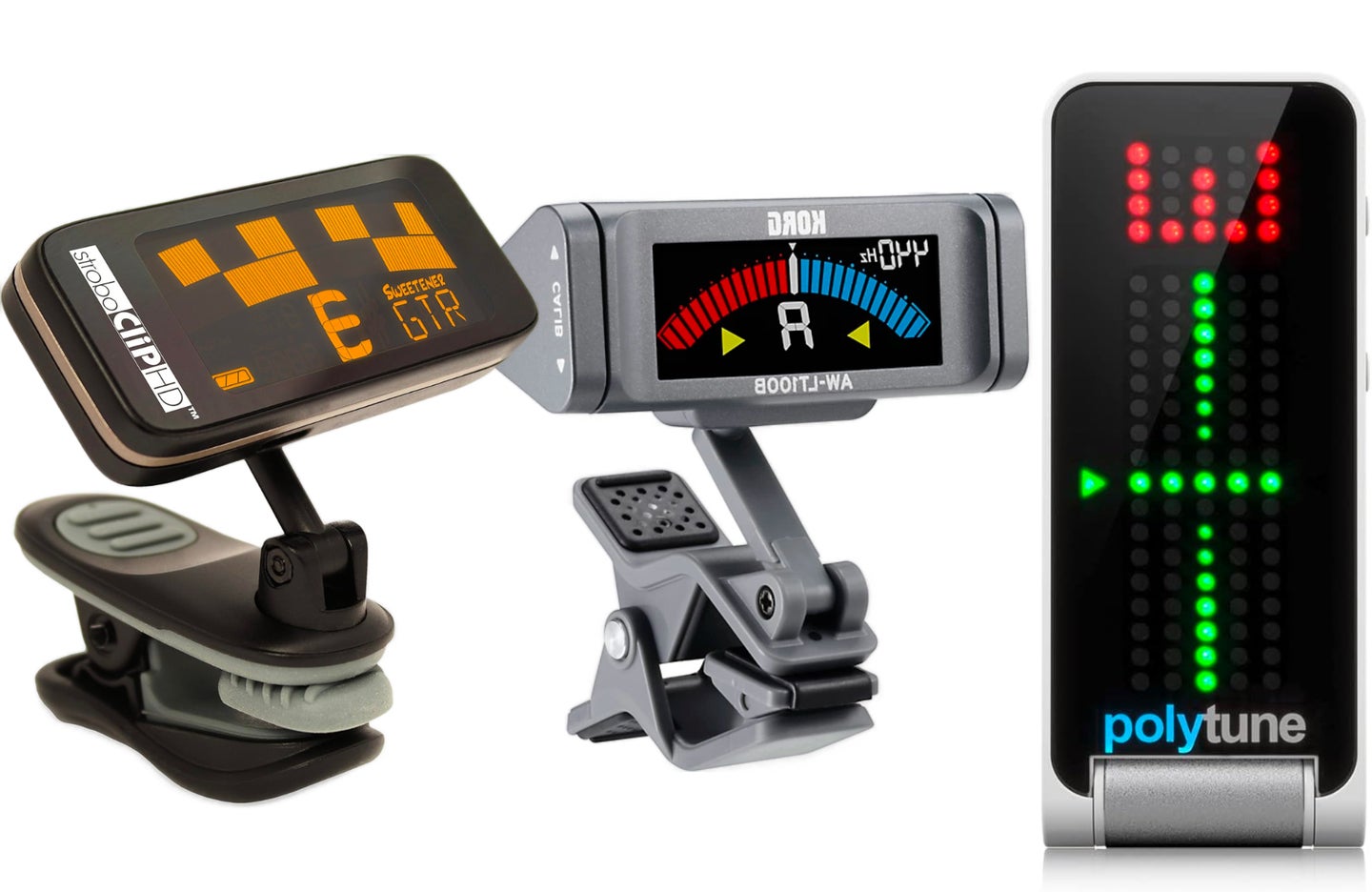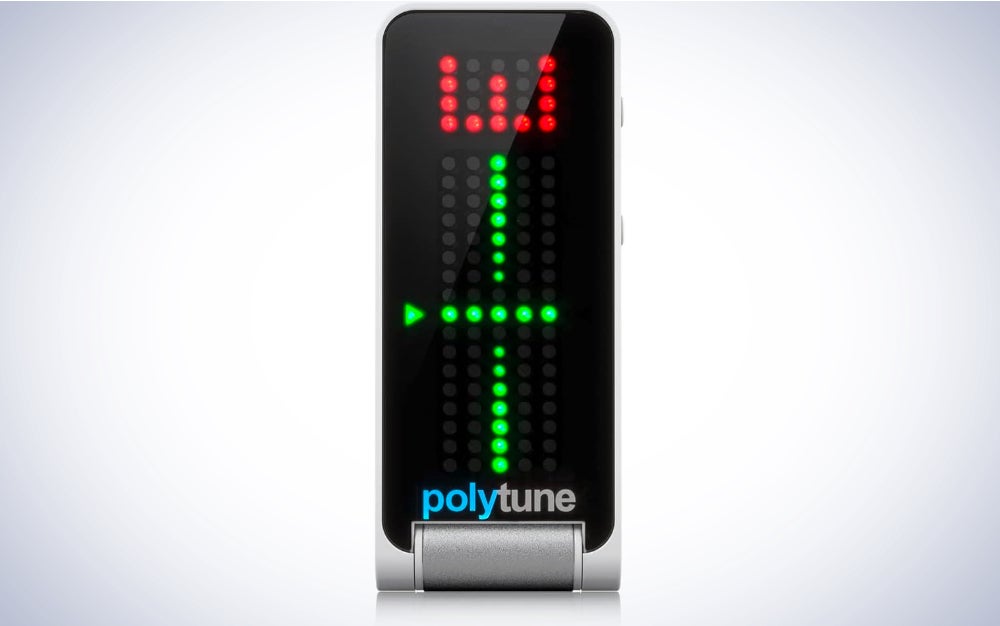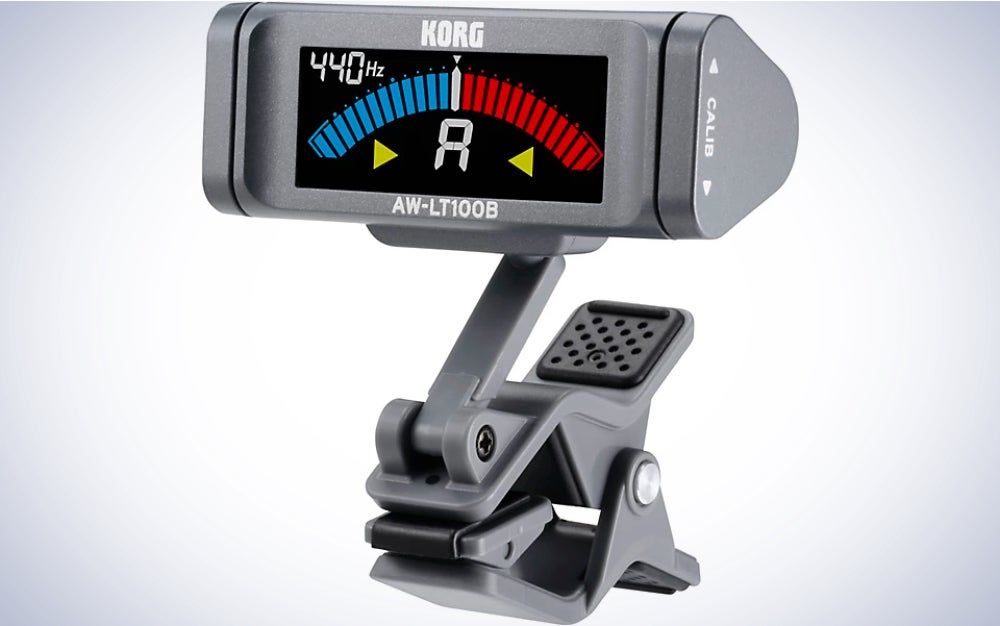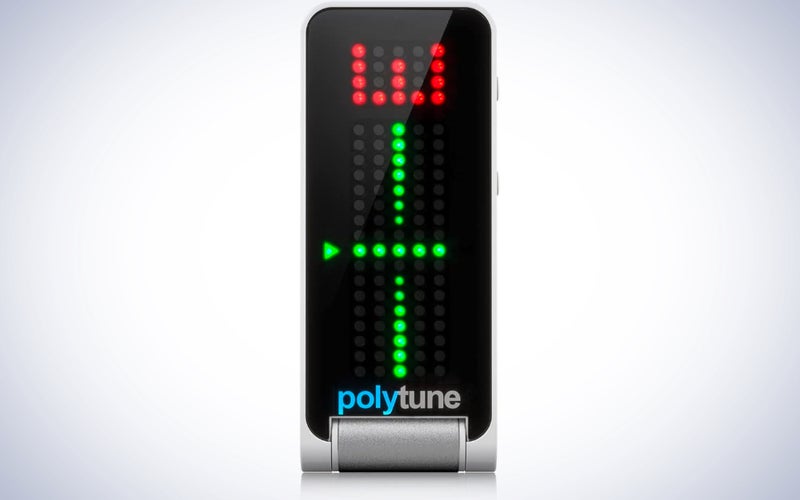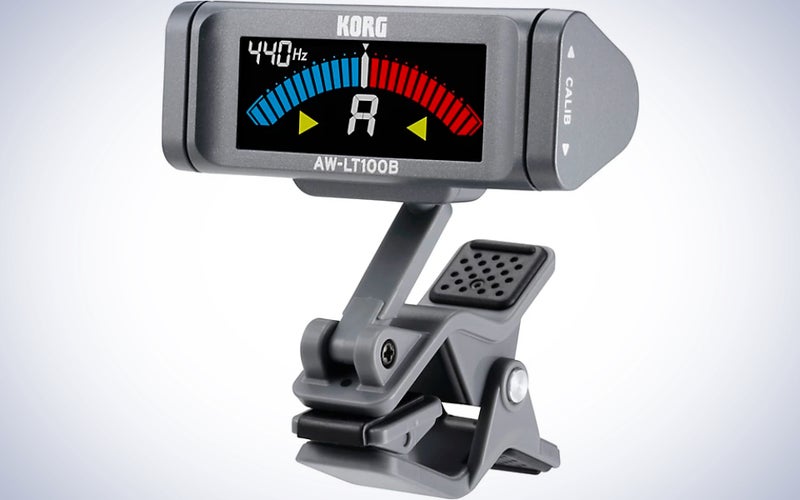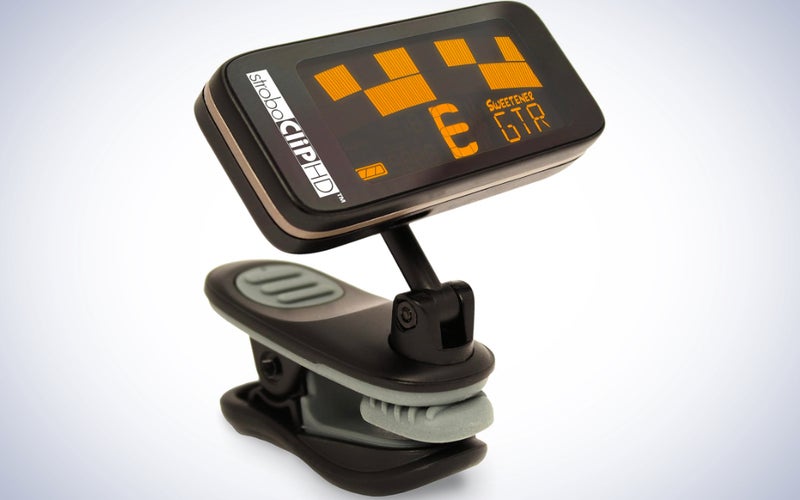We may earn revenue from the products available on this page and participate in affiliate programs. Learn more ›
Clip-on guitar tuners are an essential piece of equipment for keeping instruments pitch-perfect thanks to their lightweight battery-powered functionality and compact designs that can fasten to almost any part of an instrument. Unlike a plug-in tuner guitar pedal (typically preferred by electric guitar players), clip-on guitar tuners use a built-in piezoelectric pickup to capture the instrument’s vibrations and convert them to electrical signals to display the instrument’s pitch on an integrated display. Clip-on tuners aren’t just for guitars, either; they can be used on fully acoustic instruments that lack pickups, such as banjos, mandolins, violins, woodwinds, and more.
We compiled this list of the best clip-on guitar tuners with a strong emphasis on performance and accuracy, which coincide directly with build quality and brand reputation overall. Because clip-on tuners use sensitive components and require a secure attachment to an instrument’s headstock to perform accurately, we selected designs that feature a snug fit and durable designs that are less likely to wear out from regular use. Readability is another factor we considered for inclusion on this list, and while most of the clip-on guitar tuners here feature bright color LCD screens, a couple of the picks are easier to read in direct sunlight than others. Here’s a rundown of the best clip-on guitar tuners to use on stage and in the studio.
- Best overall: TC Electronic PolyTune Clip
- Best for bass: Korg AW-LT100B
- Best display: Peterson StroboClip HD
The best clip-on guitar tuners: Reviews & Recommendations
Best overall: TC Electronic PolyTune Clip
TC Electronic
Specs
- Reference Pitch: A4 = 435 – 445 Hz
- Accuracy: ±0.5 cent (chromatic), ±0.02 cent (strobe)
- Range: A0 to C8
- Modes: Guitar, bass, capo, polyphonic
- Battery: 1 x CR2032
- Dimensions: 0.98 x 2.3 x 1.1 inches (L x W x H)
- Weight: 0.07 pounds
Pros
- Polyphonic tuning mode for very fast adjustments
- Extremely good ±0.02 cent accuracy in strobe mode
- Bright display
Cons
- Can drain batteries quickly
The TC Electronic PolyTune Clip follows in the footsteps of the company’s acclaimed Polytune pedal, offering the same at-a-glance polyphonic tuning in a compact clip-on form. Unlike traditional tuners that require users to play one string at a time, the PolyTune Clip allows players to strum all open strings simultaneously for a quick overview of which strings require adjustment. In practice, this dramatically cuts down on the time spent tuning, making the PolyTune Clip a fantastic choice for professional use on stage and in the studio. The tuner also features a very bright LED display that adapts according to its user-controlled swivel angle and offers an incredible accuracy of ±0.02 cents in strobe mode, making this the most accurate tuner we’ve ever tested. All these perks do come at a price, though—the PolyTune Clip tends to eat batteries, so make sure you have a few extras on hand.
Best for bass: Korg AW-LT100B
KORG
Specs
- Reference Pitch: A4 = 436 – 445 Hz
- Accuracy: ±0.1 cent
- Range: E0 to C5
- Modes: Bass
- Battery: 1 x AAA
- Dimensions: 2.36 x 2.36 x 2.17 inches (L x W x H)
- Weight: 0.07 pounds
Pros
- Up to 100-hour battery life
- Supports low B on 5-string basses
Cons
- Moves easily when handled
The Korg AW-LT100B features a tuning detection range that reaches down to a low E0 or roughly 20 Hz, making it ideal for use on bass, baritone guitar, and other low-frequency stringed instruments. We love that it’s powered by a single common AAA battery instead of a traditional watch battery, which makes it easy and convenient to keep powered and gives it a maximum operation time of close to 100 hours. While the AW-LT100B does have a tendency to swivel around when it’s handled, its intuitive shuttle switches are easy to access from any angle and its super bright and easy-to-read LCD screen comes in handy for accurate viewing from a distance on longer-necked instruments.
Best display: Peterson StroboClip HD
Peterson
Specs
- Reference Pitch: A4 = 390 – 490 Hz
- Accuracy: ±0.1 cent
- Range: C0 – B6
- Modes: Capo, drop tuning, over 50 “sweetened” modes
- Battery: 1 x CR2032
- Dimensions: 1.75 x 2.4 x 1.2 inches (L x W x H)
- Weight: 0.1 pounds
Pros
- Fast, high-resolution strobe tuning with 0.1 cent accuracy
- Very bright display is easy to read anywhere
- Bank of over 50 enhanced tunings for a variety of instruments
Cons
- Controls can be cumbersome
A clip-on guitar tuner is only as useful as its display is visible, and the Peterson StroboClip HD offers the best visibility on the market, making it a great choice for people with low vision or for use outdoors and on bright stages. In addition to featuring a bright high-contrast LCD, the StroboClip HD’s display uses ultra-fast strobe action to convey an accurate depiction of whether notes are sharp or flat at a quick glance. The tuner also packs a bank of Peterson’s signature “sweetened” tunings that allow for subtle musical variations for lap steel guitars, violins, and other stringed instruments, making it a particularly desirable option for bluegrass musicians and others who work in ensembles. We found the StroboClip HD’s three-button control design to be simple and intuitive, but it can be challenging to navigate on the fly, particularly due to its combination power-menu button.
Here are other options that might be more attuned to your specific needs:
- Best compact: D’Addario Micro Headstock Tuner
- Best rechargeable: Snark ST-8 Titanium
- Best for acoustic guitar: Korg Rimpitch C2
- Best budget: Fender FCT-2
FAQs
Q: How much do clip-on guitar tuners cost?
Clip-on guitar tuners cost around $20 to $60.
Q: Can clip-on guitar tuners be used with different instruments?
Yes, with few exceptions, clip-on guitar tuners can be used on stringed instruments other than guitars. Most clip-on guitar tuners are designed with a wide pitch range that’s suitable for use on guitar, banjo, mandolin, bass, and everything in between. If you’re looking for something versatile, the TC Electronic PolyTune Clip is a solid choice that works on a wide range of stringed instruments. If you’re primarily playing bass, the Korg AW-LT100B features very quick reading of low-frequency notes and is also fully compatible with standard guitars. A clip-on tuner like the Peterson StroboClip HD is also compatible with a wider range of instruments that includes woodwinds, brass, and orchestral instruments.
Q: Are clip-on guitar tuners reliable?
Clip-on guitar tuners are very reliable and generally perform just as well as plug-in tuners, with most having an average accuracy of ±0.1 cent. In some rare cases, a plug-in guitar tuner may be more reliable than a clip-on guitar tuner if the instrument doesn’t resonate enough for the clip-on tuner to achieve a clear reading.
Q: Are clip-on guitar tuners good to use outdoors or in bright locations?
Readability is one of the most important yet overlooked traits in a clip-on guitar tuner. Despite their convenience and portability, many designs fail to remain visible in direct sunlight or on bright stages. The Peterson StroboClip HD outperforms nearly all other designs in the readability department, but we also like the compact color-customizability of the display on the D’Addario Micro Headstock Tuner.
Q: Do clip-on guitar tuners have good battery life?
Most clip-on guitar tuners are powered by CR2032 “watch” batteries, which enhances their portability and keeps them lightweight. However, these types of batteries are notorious for their short life, especially when used in a product with a display like a clip-on guitar tuner. It’s not uncommon to have to change the batteries in a clip-on guitar tuner once every month; if you’re looking for something with more longevity and don’t mind the extra weight, a AAA-battery-powered clip-on guitar tuner like the Korg AW-LT100G or a bass tuner like the Korg AW-LT100B are good alternatives.
Final thoughts on the best clip-on guitar tuners in 2023
- Best overall: TC Electronic PolyTune Clip
- Best for bass: Korg AW-LT100B
- Best display: Peterson StroboClip HD
Clip-on guitar tuners are a great alternative to pedal-style guitar tuners whether you’re playing unplugged or you just want a tuner that displays at eye level. Our favorite overall is the TC Electronic PolyTune Clip thanks to its incredibly accurate performance and polyphonic capabilities, while the Peterson StroboClip HD comes in a close second for its readability and versatility. If you’re playing a low-frequency guitar like a bass or baritone, the Korg AW-LT100B is a great option thanks to its extended range and long battery life.
Why trust us
Popular Science started writing about technology more than 150 years ago. There was no such thing as “gadget writing” when we published our first issue in 1872, but if there was, our mission to demystify the world of innovation for everyday readers means we would have been all over it. Here in the present, PopSci is fully committed to helping readers navigate the increasingly intimidating array of devices on the market right now.
Our writers and editors have combined decades of experience covering and reviewing consumer electronics. We each have our own obsessive specialties—from high-end audio to video games to cameras and beyond—but when we’re reviewing devices outside of our immediate wheelhouses, we do our best to seek out trustworthy voices and opinions to help guide people to the very best recommendations. We know we don’t know everything, but we’re excited to live through the analysis paralysis that internet shopping can spur so readers don’t have to.
